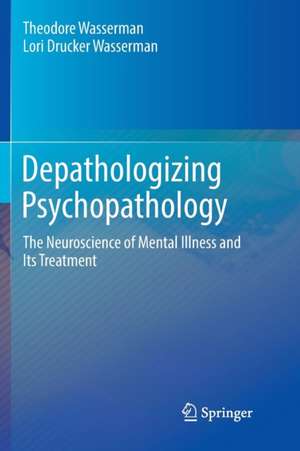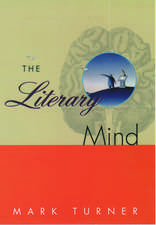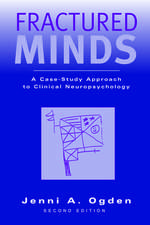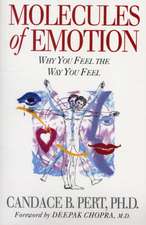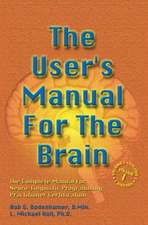Depathologizing Psychopathology: The Neuroscience of Mental Illness and Its Treatment
Autor Theodore Wasserman, Lori Drucker Wassermanen Limba Engleză Paperback – 31 mai 2018
- Proposes a non-stigmatizing learning model for therapy, Neuro-Cognitive Learning Therapy.
- Introduces the concept of the connectome and explains its critical role in mental health and illness.
- Differentiates between the unconscious and automaticity in cognition and behavior.
- Addresses the applicability of NCLT to biologically-based mental disorders.
- Offers case studies illustrating NCLT in contrast with commonly-used approaches.
- Includes a chapter-by-chapter clinical teaching guide with therapeutic principles and discussion questions.
- Provides a comprehensive therapeutic framework for practitioners of all orientations.
| Toate formatele și edițiile | Preț | Express |
|---|---|---|
| Paperback (1) | 382.18 lei 6-8 săpt. | |
| Springer International Publishing – 31 mai 2018 | 382.18 lei 6-8 săpt. | |
| Hardback (1) | 389.49 lei 6-8 săpt. | |
| Springer International Publishing – 27 iul 2016 | 389.49 lei 6-8 săpt. |
Preț: 382.18 lei
Nou
Puncte Express: 573
Preț estimativ în valută:
73.15€ • 79.49$ • 61.49£
73.15€ • 79.49$ • 61.49£
Carte tipărită la comandă
Livrare economică 21 aprilie-05 mai
Preluare comenzi: 021 569.72.76
Specificații
ISBN-13: 9783319809137
ISBN-10: 331980913X
Ilustrații: IX, 181 p. 2 illus. in color.
Dimensiuni: 155 x 235 mm
Greutate: 0.28 kg
Ediția:Softcover reprint of the original 1st ed. 2016
Editura: Springer International Publishing
Colecția Springer
Locul publicării:Cham, Switzerland
ISBN-10: 331980913X
Ilustrații: IX, 181 p. 2 illus. in color.
Dimensiuni: 155 x 235 mm
Greutate: 0.28 kg
Ediția:Softcover reprint of the original 1st ed. 2016
Editura: Springer International Publishing
Colecția Springer
Locul publicării:Cham, Switzerland
Cuprins
Principles of Learning.- Therapy versus education--why education is better.- Automaticity.- How we learn.- Mental illness as a white matter connectivity problem.- What Is Cognitive Learning Therapy?.- Introduction to cognitive learning therapy.- Key concepts in cognitive learning therapy.- The relationship between therapist and client in cognitive learning therapy.- Applications of Cognitive Learning Therapy.- Cognitive learning therapy for depression.- Cognitive learning therapy for obsessive thinking and compulsive behavior.- Cognitive learning therapy for anxiety and other regulatory disorders.- Cognitive learning therapy and educating parents on how to manage their children.- Summary and concluding remarks: where do we go from here?.
Recenzii
“This volume might be best used as an addition to an advanced psychopathology for graduate students and psychiatry residents. … the authors include an appendix with suggested teaching objectives and exercises. It will also be of use and of interest to practitioners and researchers. There is much of intellectual and clinical value in this volume. Wasserman and Wasserman do us a great service in challenging the status quo and in developing a true neuropsychological model of psychopathology and its treatment.” (Jerry Gold, PsycCRITIQUES, Vol. 62 (7), February, 2017)
Notă biografică
Ted Wasserman is a pediatric neuropsychologist specializing in the treatment of neurodevelopmental disorders, currently in private practice. From 2008 through 2013 he was associate professor of psychology at the Institute for Achievement and Learning at Lynn University. He received his PhD in clinical psychology from Hofstra University and completed his post-doctoral fellowship in cognitive behavioral psychotherapy at the Institute for Advanced Study of Rational Psychotherapy. He is a member of APA Divisions 40 and 12, National Academy of Neuropsychology, and International Neuropsychological Society. He is the founder and past president of the American Board of Pediatric Neuropsychology and is board-certified in clinical psychology by the American Board of Professional Psychology. Lori Wasserman is a pediatric neuropsychologist who is currently in private practice. She received her PhD in clinical and school psychology from Hofstra University and is a member of APA Division 40 and theNational Academy of Neuropsychology. She is board-certified in pediatric neuropsychology by the American Academy of Pediatric Neuropsychology.
Textul de pe ultima copertă
This brief, accessible treatise harnesses the neurophysiological processes of learning to create an innovative and powerful approach to therapy. It sets out a non-pathologizing alternative not only to the current medicalized conception of diagnosis and treatment but also to the labeling of relatively normal reactions to stressors and upsets as illnesses. Rooted in the neurobiology of human learning, the book’s approach to treatment, Neuro-Cognitive Learning Therapy, characterizes maladaptive behavior patterns as learned responses to upsetting conditions—processes which can be unlearned. In addition, the coverage includes a clinical teaching guide for bringing NCLT theory and methods into the training curriculum.
This groundbreaking volume:
- Proposes a non-stigmatizing learning model for therapy, Neuro-Cognitive Learning Therapy.
- Introduces the concept of the connectome and explains its critical role in mental health and illness.
- Differentiates between the unconscious and automaticity in cognition and behavior.
- Addresses the applicability of NCLT to biologically-based mental disorders.
- Offers case studies illustrating NCLT in contrast with commonly-used approaches.
- Includes a chapter-by-chapter clinical teaching guide with therapeutic principles and discussion questions.
- Provides a comprehensive therapeutic framework for practitioners of all orientations.
Caracteristici
Conceptualizes the therapeutic process as a learning experience Provides therapeutic techniques that are adaptable to a variety of clinical approaches Synthesizes previously isolated fields of neurology, learning theory, and behavioral care
